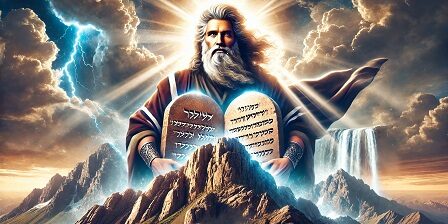From The Rabbi’s Study… Shabbat,March 14,15, 2025/14,15 Adar 5785
Purim: Erev Purim Tan’anit Esther 13 Adar is when Queen Esther fasted before going unannounced to speak with the King. Purim 14 Adar, and Shushan Purim is celebrated on 15 Adar.
Hag Purim!
A summary of the Torah portion begins with G-d instructs Moses to collect a half-shekel from every person over the age of twenty when he takes a census of the community. Moses is told that the sanctuary’s furnishings are to be fashioned by the skilled artisan Bezalel. Moses reminds the people in observing the Sabbath they celebrate the covenant between themselves and G-d. Moses is given two tablets on Mount Sinai. Forty days have passed, and the Israelites have asked Aaron to make a golden calf. Aaron agrees. When Moses sees the golden calf, he shatters the two tablets and returns to Mount Sinai. After the second forty days, Moses returns to the people, radiant from speaking to G-d. He covers his face with a veil.
Since Aaron should have known not to make the golden calf because he was the High Priest, so why did he agree? One has to realize the Israelites still had not only a slave mentality but also were surrounded by the Egyptian idols. Moses, their leader, was gone for what may have scared the Israelites that he would never come back. So Aaron tried to stall for time. Nechama Leibowitz, a commentator of the Torah views the story as Aaron ‘s failure as a leader or the sin of the Israelites, but a deliberate warning that human beings are capable of acting nobly one moment and badly the next.
This Torah portion has the thirteen attributes to describe G-d. Since it is impossible to describe G-d, it is the essence of G-d’s divine qualities taken from the two verses that analyze the implications of each phrase: “The Lord! A G-d compassionate and gracious, slow to anger, rich in kindness and truth, extending kindness to the thousandth generation, forgiving iniquity, transgression, and sin; yet G-d will by no means clear the guilty” (Exodus 34:6-7). These verses comprising the thirtieth attributes are recited before the open ark on all the Jewish holidays, except when the holiday falls on the Sabbath.
The Haftarah, the Israelites were deciding between G-d and Baal. The time is during King Ahab and his Phoenician wife Jezebel, who pursued the prophet with murderous cruelty. It was treason to proclaim G-d of Israel. During these dark times, Elijah stands out in all his greatness. The prophet Elijah confronts the king and queen, and pronounces bravely that their doom will follow their apostasy, and their outrage of justice.
This was the moment of the two altars on Mount Carmel. One was for Baal the other for the G-d of Israel. Wind and raining the wood on the altar of Baal did not catch fire, however the one Elijah lit, miraculously burnt. All the people proclaim the G-d of Israel.
These are the last words from the end of the Yom Kippur service, and the last words uttered by dying Israelites.
Also, this is one of the reasons the prophet Elijah is honored at the Passover Seder with a cup, at a boy’s brit milah, and this prophet will announce the coming of the Messiah.
This Sabbath Queen Esther saved our Jewish people centuries ago and the Jewish people will be celebrating. All of us pray that the Hostages will be returned to their loved ones. All of us pray that the violence and anti-Semitic rhetoric on campuses will end. There is power in praying together in one strong voice to G-d. Dark times take each of us to bring more of our light by doing righteous actions and speaking or writing to help to make that change. Am Ysrael Chai!
Shabbat Shalom V’ Hag Purim,
Rabbi Helene Ainbinder








